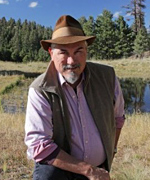—Alan Dulaney

The Central Arizona Water Conservation District’s conflicts, once confined within Arizona, have now spilled across state boundaries into the Upper Colorado River Basin. The collaborative structure of the entire Colorado River Basin — the Law of the River, developed over a century of quiet agreements and respect for the concerns of all — is now in danger of collapse.
CAWCD has been aiming for a “sweet spot” in which 9 million acre-feet must be released to Lake Mead from Lake Powell, while Lake Mead water levels hover just above the trigger level for a declared shortage. CAWCD would get all of the Colorado River water it needs — at the expense of the Upper Basin. Lake Powell might drop as much as 30 feet in 2019. This would betray the efforts of the Upper Basin users who have been trying to maintain its water level elevations through a System Conservation Pilot Program. This program compensates users for forbearance of the use of their water in order to support water level elevations in Lake Powell, and the money comes from Denver and Pueblo, amongst others.
On April 13, the water representatives of the Upper Colorado River Basin states and the Upper Colorado River Commission penned a letter to ADWR accusing CAWCD of ignoring the Basin’s dire situation and manipulating water orders to gain more water for itself “at the expense of Lake Powell and all the other Basin states.” These are harsh words for the water world and indicate a depth of distrust for CAWCD never seen before.
On April 16, Denver Water followed up with a letter to CAWCD threatening to terminate its funding for the System Conservation Pilot Program. The letter said that CAWCD must “verifiably establish it has ceased all actions to manipulate demands and is fully participating in aggressive conservation measures along with other entities in Arizona.” That’s pretty blunt. A few days later, the City of Pueblo actually did pull all their funding from the System Conservation Pilot Program, washing their hands of any pretense of cooperation with CAWCD.
Finally, CAWCD sensed that it was burning bridges in all directions. Therefore, on April 30, the CAWCD met with the Upper Basin representatives and apologized for its rhetoric, promising to be more respectful and cooperative on Colorado River issues, and to work on the drought contingency plan for the Lower Basin. But the CAWCD press release did not say that it would cease manipulating water orders to maximize releases from Lake Powell. It is not yet clear how the other Basin states — and, indeed, the rest of Arizona — will view the CAWCD position, or more importantly, its future actions. Notably, some water managers are talking openly of the need for Federal intervention, a concept that, before now, has been anathema amongst Western states.
Good articles on the situation, with in-depth explanations of positions, can be found here:
- Four states that also get Colorado River water say CAP keeps too much for Arizona
- Fleck’s blog
- Five Things To Know About The Latest Colorado River Dust Up
- Colorado and three states accuse Arizona of manipulating Colorado River supply and demand
- State Colorado River Managers Cry Foul Over Arizona’s Attempted Water Shuffle